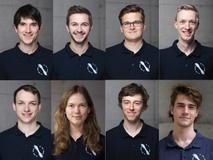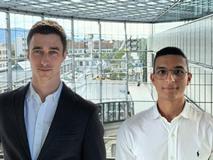CHF 40,000 for inspections drones, physics-driven AI, and next-gen blood pressure regulation
13.03.2025
AITHON Robotics, Lemna Bio, and Neurovia Bioelectronics were selected at Venture Kick's second financial and entrepreneurial support stage. Their projects combine the capabilities of human workers with the mobility of uncrewed aerial vehicles; transform biomolecule design with physics-driven AI models that are uniquely efficient, capable of representing any biomolecule, and adaptable to diverse challenges and contexts in drug development; and introduce a minimally invasive implant capable of regulating autonomic functions like blood pressure using real-time neural stimulation.
 |
 AITHON Robotics' Team
|
 Lemna Bio: CSO Lucien Krapp & CEO Moustafa Houmani
|
 Neurovia Bioelectronics: CEO William Esposito and CTO Omar Shalby
|
AITHON Robotics: Rapid Access for Hazardous Tasks
Infrastructure assets require constant inspection and maintenance to be operated safely. These tasks are expensive as they induce asset downtimes and the existing access solutions are limited. This further increases the total cost of ownership as only insufficient information on the asset condition exists. Lastly, the workers performing the work are put in constant danger of falling from heights.
AITHON Robotics combines the capabilities of human workers with the mobility of uncrewed aerial vehicles. Their drones can perch on structures, such as underneath bridges or on hydropower dams, and allow for force-intense and precise work. Through tethered flight, they can perform enduring missions and carry heavy payloads for a wide array of tasks: sensor installation, radar- and ultrasound scanning, sample collection, and repair works with mortar injection. This makes their technology a novel solution for the growing drone inspection market (~15%CAGR) at a time when asset owners are looking for faster and more precise insights into their assets.
The Venture Kick funds will contribute toward the technological maturity of their drones, by allowing them to improve the tethered power supply for high-altitude flights up to 80m.
Lemna Bio: Physics-Driven AI for Solving Biology’s Grand Challenges
Drug development faces soaring costs, regulatory hurdles, and a 90% failure rate. Despite the promise of AI, current models fail to deliver complex biomolecular solutions with context and efficiency, limiting their ability to accelerate breakthroughs in drug development.
Lemna Bio transforms biomolecule design with physics-driven AI models that are uniquely efficient, capable of representing any biomolecule, and adaptable to diverse challenges and contexts in drug development. Dr. Lucien Krapp, Co-founder and CSO, developed the core technology during his PhD at Professor Matteo Dal Peraro’s lab, now Lemna’s Scientific Co-founder. Moustafa Houmani, Co-founder and CEO, is a biochemical engineer and second-time biotech founder with expertise in protein engineering. Their innovation has attracted interest from top pharmaceutical companies, positioning Lemna to drive biomedicine’s golden age through high-value partnerships in a trillion-dollar market.
The Venture Kick funds will enhance Lemna’s branding, communication, and outreach efforts, strengthening its presence, and accelerating partnerships with industry leaders.
Neurovia Bioelectronics: Revolutionizing blood pressure regulation
Chronic neurological disorders like Parkinson’s disease and Multiple System Atrophy disrupt the autonomic nervous system, causing severe issues such as blood pressure instability and urinary dysfunction. Current treatments are invasive and often ineffective.
Neurovia Bioelectronics, based in Geneva, Switzerland, introduces a minimally invasive implant capable of regulating autonomic functions like blood pressure using real-time neural stimulation. The device, inserted via a catheter, reduces patient recovery times and improves therapeutic efficacy. Their team, led by CEO Dr. William Esposito and CTO Omar Shalby, leverages expertise in material sciences and neuroengineering, targeting an estimated $500 million market in orthostatic hypotension.
The Venture Kick Stage 1 funds will support our prototype refinement and market exploration, bringing us closer to validating our implant's necessity in regulating blood pressure in patients with autonomic disorders.
Infrastructure assets require constant inspection and maintenance to be operated safely. These tasks are expensive as they induce asset downtimes and the existing access solutions are limited. This further increases the total cost of ownership as only insufficient information on the asset condition exists. Lastly, the workers performing the work are put in constant danger of falling from heights.
AITHON Robotics combines the capabilities of human workers with the mobility of uncrewed aerial vehicles. Their drones can perch on structures, such as underneath bridges or on hydropower dams, and allow for force-intense and precise work. Through tethered flight, they can perform enduring missions and carry heavy payloads for a wide array of tasks: sensor installation, radar- and ultrasound scanning, sample collection, and repair works with mortar injection. This makes their technology a novel solution for the growing drone inspection market (~15%CAGR) at a time when asset owners are looking for faster and more precise insights into their assets.
The Venture Kick funds will contribute toward the technological maturity of their drones, by allowing them to improve the tethered power supply for high-altitude flights up to 80m.
Lemna Bio: Physics-Driven AI for Solving Biology’s Grand Challenges
Drug development faces soaring costs, regulatory hurdles, and a 90% failure rate. Despite the promise of AI, current models fail to deliver complex biomolecular solutions with context and efficiency, limiting their ability to accelerate breakthroughs in drug development.
Lemna Bio transforms biomolecule design with physics-driven AI models that are uniquely efficient, capable of representing any biomolecule, and adaptable to diverse challenges and contexts in drug development. Dr. Lucien Krapp, Co-founder and CSO, developed the core technology during his PhD at Professor Matteo Dal Peraro’s lab, now Lemna’s Scientific Co-founder. Moustafa Houmani, Co-founder and CEO, is a biochemical engineer and second-time biotech founder with expertise in protein engineering. Their innovation has attracted interest from top pharmaceutical companies, positioning Lemna to drive biomedicine’s golden age through high-value partnerships in a trillion-dollar market.
The Venture Kick funds will enhance Lemna’s branding, communication, and outreach efforts, strengthening its presence, and accelerating partnerships with industry leaders.
Neurovia Bioelectronics: Revolutionizing blood pressure regulation
Chronic neurological disorders like Parkinson’s disease and Multiple System Atrophy disrupt the autonomic nervous system, causing severe issues such as blood pressure instability and urinary dysfunction. Current treatments are invasive and often ineffective.
Neurovia Bioelectronics, based in Geneva, Switzerland, introduces a minimally invasive implant capable of regulating autonomic functions like blood pressure using real-time neural stimulation. The device, inserted via a catheter, reduces patient recovery times and improves therapeutic efficacy. Their team, led by CEO Dr. William Esposito and CTO Omar Shalby, leverages expertise in material sciences and neuroengineering, targeting an estimated $500 million market in orthostatic hypotension.
The Venture Kick Stage 1 funds will support our prototype refinement and market exploration, bringing us closer to validating our implant's necessity in regulating blood pressure in patients with autonomic disorders.


